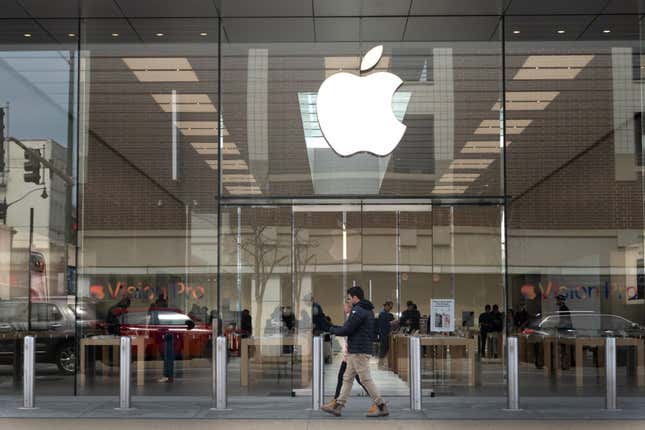
In This Story
Apple is reportedly developing AI chips in partnership with Taiwan Semiconductor Manufacturing Co. The initiative code-named Project ACDC, for “Apple Chips in Data Center,” would allow Apple to run artificial intelligence software on its own chips in data centers, according to The Wall Street Journal.
Apple did not immediately respond to Quartz’s request for comment, nor did the company provide comments to The Journal. The Journal’s unnamed sources did not give a timeframe for when Apple’s chip would be released, if ever.
Apple’s AI strategy has been shrouded in mystery, but investors and consumers can expect company executives to shed light on its plan and coming AI products during Apple’s Worldwide Developers Conference in early June. CEO Tim Cook has alluded to a big unveiling at WWDC in vague statements during the company’s past two earnings calls with investors.
“We see generative AI as a very key opportunity across our products, and we believe that we have advantages that set us apart there,” Cook said during Apple’s second quarter earnings presentation May 2. Cook said the company would reveal more in “the weeks ahead.”
There’s no reason to think Apple’s initial products would run on its own AI chips.
“For all intents and purposes, the AI from Apple will be on device at least from the get-go and probably using third party infrastructure, not something they’re creating on their own,” Anduril CEO Palmer Lucky told Bloomberg’s Caroline Hyde in a Bloomberg Technology podcast episode Monday. “But one day I do expect Apple to move to its own AI server environments.”
Having its own AI chip would help Apple better rival the likes of Google, Meta, and Microsoft, which have all made leaps in the AI race in part by creating their own hardware.
Such custom AI chips, however, aren’t meant to rival Nvidia’s — Google and Meta won’t be mass producing general-purpose AI chips for other companies — but could help tech firms reduce their spend on third party products (i.e. Nvidia’s H100s). Their growing self-reliance could threaten Nvidia’s revenues, which are heavily reliant on the company’s Big Tech customers.